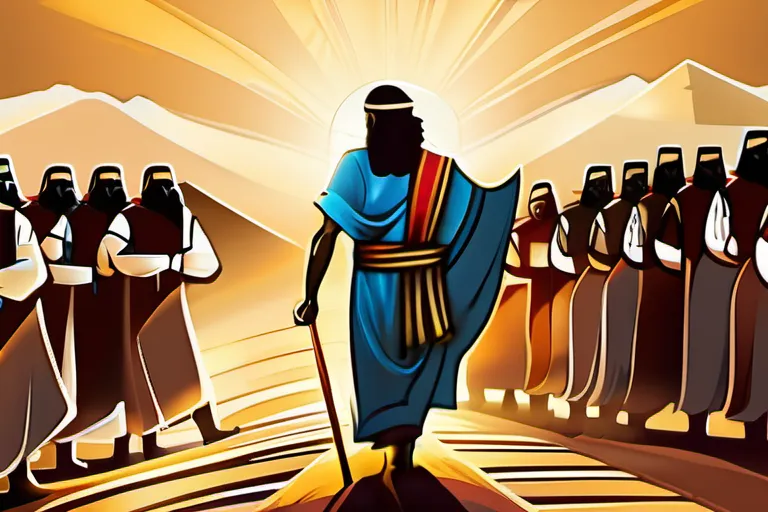Exploring the Importance and Impact of the Biblical Narrative on Christians
Delve into the profound significance of the story of Exodus for Christians, as we unravel its historical, theological, and cultural importance within Christianity.
The Historical Context of Exodus
The Exodus story is like a towering mountain, looming over the landscape of biblical narratives. How did the Israelites end up enslaved in Egypt? Was it just bad luck, or was there something more profound at play? Historians suggest that around 1200 BCE, during the New Kingdom period of ancient Egypt, the Hyksos people had ruled over parts of Egypt before being expelled by the Egyptians. This power vacuum might have led to a new pharaoh who did not know Joseph, causing him to see the Israelites as a potential threat rather than an ally. This scenario sets up a dramatic tension that echoes through time.
Imagine a vast sea of faces, all in chains, working tirelessly under the sun’s relentless gaze. The oppression was so crushing it felt like the earth itself was weighing down on their spirits. Yet, amidst this darkness, there emerged a leader named Moses, appointed by God to lead his people out of slavery. This transformation is like watching a caterpillar struggling to break free from its cocoon—painful yet necessary for growth.
The Israelites’ journey through the wilderness can be seen as a metaphorical exodus from the comfort zones of their old lives into the unknown and promised land. Their wandering was not just physical but also spiritual, testing their faith and trust in God’s promises. The Red Sea crossing became more than just a historical event; it symbolized the Israelites’ liberation from their past sins and their journey toward freedom.
As we explore the historical context of the Exodus story, it becomes clear that this narrative is not merely about ancient events but resonates deeply with contemporary struggles. Just as the Israelites found hope in God’s guidance, modern Christians find solace and strength in similar promises. The Exodus reminds us that even in the most challenging times, there is always a way out, and freedom lies on the other side of struggle.
The Theological Significance of Exodus
The theological significance of the Exodus story in Christianity cannot be overstated. It’s like a lighthouse guiding us through the darkest moments of our lives, illuminating the path to freedom and redemption. Can we truly grasp how profound God’s covenant with the Israelites was? This covenant wasn’t just about the past; it spoke volumes about the present and future of His people.
Imagine, for a moment, that you are one of the Israelites living under Pharaoh’s cruel rule. You wake up each day chained to a task, your hope slowly fading like the morning mist. But then, out of nowhere, comes this promise from God: ‘I am the Lord; I will bring you out from under the yoke of slavery… and I will redeem you.’ Isn’t that a breathtaking promise?
The concept of redemption woven through the Exodus narrative is incredibly powerful. It’s not just about being physically freed from bondage but also spiritually liberated from sin. The idea that God would personally intervene to save His people, offering them a new start and a future filled with hope—this is nothing short of miraculous.
Moreover, the covenant established at Mount Sinai represents a deep, unbreakable bond between God and His chosen people. It’s like signing on the dotted line of an eternal contract, promising both love and accountability. How can we understand our own relationship with Christ without recognizing this pattern?
The lessons from Exodus extend far beyond the pages of the Old Testament. They speak to our hearts today, reminding us that no matter how deep the darkness or how heavy the burden, God is always there, offering His hand and calling us out of the shadows into the light. It’s a story of hope that resonates through generations, encouraging Christians to persevere in faith and find strength in adversity.
Exodus in the Old Testament
The Exodus story in the Old Testament isn’t just a historical account; it’s a profound narrative that serves as a backdrop for understanding the broader context of biblical history and theology. Imagine the Exodus as a mighty river, flowing through the sands of time to shape the destinies of nations and individuals alike. How does this story connect with other narratives in the Old Testament?
Consider the patriarchal stories, like those of Abraham or Joseph—doesn’t the Exodus echo their experiences of journeying from slavery to freedom? The covenant God made with Abraham foreshadows the greater covenant He would establish through Moses. Just as Abraham’s descendants were promised a land, so too was Israel promised deliverance and the blessings of a new beginning.
The story of David, another significant figure in the Old Testament, seems to resonate deeply with the Exodus tale. Both stories tell of a leader who rose up against oppression, leading his people through trials to victory. Is it mere coincidence that these narratives mirror each other? Or are they interconnected chapters in a grand narrative of God’s chosen ones striving for freedom and redemption?
The Exodus also intersects with the story of Joshua, as he leads the Israelites into the promised land, much like Moses led them out. Here, the narrative loops back to themes of conquest and settlement—how does this reflect the broader journey of faith? Are these stories a continuous line, each building upon the last to form a coherent whole?
In exploring these connections, we see that the Exodus is not isolated but deeply intertwined with other biblical narratives. It serves as a pivotal point where themes of slavery and freedom, covenant and redemption, are explored in rich detail. By understanding its place within this broader context, Christians can better appreciate the theological significance of the Exodus story and its ongoing relevance in their lives.
So, as we delve deeper into these interconnected narratives, let us consider how each piece fits together to form a tapestry of divine purpose and human redemption. Could it be that the Exodus isn’t just about one people’s past but holds lessons for all of us today?
<strong>In reflecting on these questions, we find that the Exodus story is far more than a historical event—it is a timeless testament to God’s unwavering commitment to His people and His ultimate plan for salvation.</strong>
The Exodus Story in the New Testament
The Exodus story resurfaces dramatically in the New Testament, intertwining with the narrative of Jesus Christ and Christian salvation. How can we understand the profound significance of this ancient tale when it comes to interpreting the life and mission of Jesus?
Consider the meta parallel: just as Moses led his people out of slavery, leading them toward freedom through the Red Sea, could Jesus be seen as leading a spiritual exodus for his followers? Is there an underlying message that suggests a transformation from one state to another, from bondage to liberation?
The New Testament often references the Exodus in ways that highlight themes of redemption and salvation. For instance, in Hebrews 11:26, we find the famous quote about Moses choosing to be persecuted with the people of God rather than enjoying temporary wealth. Could this not be a metaphor for Jesus’ own sacrifice and the path he sets before his followers?
Moreover, the New Testament frequently compares Christians to Israelites in the wilderness journey. Just as the Israelites wandered and struggled after leaving Egypt, so too do Christians face trials and challenges on their spiritual journey. The Exodus narrative serves as a reminder that God’s presence and provision are constant, even when the path ahead is uncertain.
So, how does understanding the Exodus‘s role in the New Testament help us grasp its deeper meaning for Christians today? Could it be that just as the Israelites needed physical liberation from bondage, Christians need spiritual freedom from sin and the chains of worldly attachments?
In essence, the Exodus story in the New Testament is not merely a historical event but a profound allegory of salvation. It speaks to the heart of what it means to follow Christ and live a life free from the burdens of sin and guilt.
The Cultural Impact of Exodus on Christianity
The cultural impact of the Exodus story on Christianity is profound and multifaceted, weaving through every fabric of Christian art, music, literature, and religious practices. Could we imagine a world where Jesus Christ was born without the backdrop of Moses’ deliverance from Egypt? How would Christian iconography look if it lacked the imagery of liberation and freedom inspired by the Exodus narrative?
Art has long been a powerful medium for conveying spiritual messages, and in Christianity, depictions of the Exodus are everywhere. From Renaissance masterpieces like Michelangelo’s Sistine Chapel ceiling, which features scenes from both the Old and New Testaments, to contemporary works that draw direct parallels between Moses’ parting of the Red Sea and Jesus’ resurrection, this narrative has been a constant source of inspiration. Think about it: how many times have you seen or heard of paintings, sculptures, or even stained glass windows depicting Moses raising his staff, symbolizing the power of faith over oppression?
Music too has embraced the Exodus story. Consider the haunting melodies of hymns like ‘The Solid Rock’ or ‘How Great Thou Art,’ which echo the themes of salvation and deliverance found in the Exodus narrative. These songs, often sung during church services or on joyful occasions like weddings or baptisms, serve as a reminder of God’s unfailing love and provision. Can you imagine Christian music without its rich tapestry of stories drawn from the Bible, with the Exodus being one of the most central?
Even literature, whether in the form of sermons, commentaries, or literary works, has been deeply influenced by the Exodus story. From Martin Luther’s Lectures on Genesis, where he expounds on the spiritual lessons to be learned from the Exodus, to modern novels that retell the biblical narrative with contemporary twists, this story continues to shape Christian discourse and understanding of faith.
Religious practices also reflect the impact of the Exodus. Baptism, for instance, often draws parallels between being ‘born again’ through water and the Israelites crossing the Red Sea, symbolizing rebirth in Christ. Communal prayers and readings during services frequently include references to Moses leading his people out of slavery, reinforcing the communal aspect of faith and collective redemption.
The Exodus story, then, is not just a historical event but a living narrative that continues to inspire, guide, and shape Christian culture. It reminds us of God’s mighty deeds in delivering His people from bondage, offering hope and liberation to those who seek Him. In the end, it serves as a powerful reminder of our own need for deliverance and the power of faith in overcoming adversity.
The Relevance of Exodus in Contemporary Christianity
The Relevance of Exodus in Contemporary Christianity: Explore the ongoing relevance of the Exodus story in contemporary Christianity, discussing its application to modern-day struggles and triumphs.
Can we truly grasp the essence of our faith without delving into the heartwarming yet harrowing tale of Moses leading his people out of Egypt? The Exodus is more than just a historical narrative; it’s a timeless metaphor for every Christian’s journey, filled with trials, challenges, and ultimately, redemption. How many times have we felt trapped in our personal ‘Egypt’, only to find ourselves yearning for the freedom promised by Christ?
Imagine yourself wandering in the wilderness, like the Israelites, facing uncertainty and fear. What would give you hope? For them, it was the promise of manna from heaven; for us today, it might be a verse from scripture or an act of kindness that brings comfort. The Exodus story teaches us to trust in God’s provision and guidance, even when we can’t see the way forward.
In modern times, Christians face their own personal plagues, be they financial struggles, health issues, or relational conflicts. The example set by Moses shows that these challenges are not insurmountable; with faith and perseverance, we too can find deliverance. And just as the Israelites had to cross the Red Sea, today’s Christians must navigate their own seas of doubt, doubt that can only be overcome through unwavering belief in God.
Moreover, the Exodus story is a powerful reminder of God’s covenant with His people, promising protection and provision. In our daily lives, this covenant manifests as a divine promise to guide us, support us, and lead us out of darkness into light. How many of us have found solace in remembering that we are part of God’s chosen people, experiencing the same journey of faith as those who walked before us?
So let us reflect on the Exodus story not just as a past event but as a present reality, guiding our steps and shaping our lives. Whether we find ourselves in slavery or freedom, the lessons from this ancient tale remain as relevant today as they were when it was first told. After all, isn’t every Christian journey an ongoing exodus, filled with miracles, struggles, and hope?
Conclusion
 Gain a deeper understanding of why the story of Exodus remains a cornerstone of Christian faith and tradition, and explore its ongoing relevance in contemporary times.
Gain a deeper understanding of why the story of Exodus remains a cornerstone of Christian faith and tradition, and explore its ongoing relevance in contemporary times.











